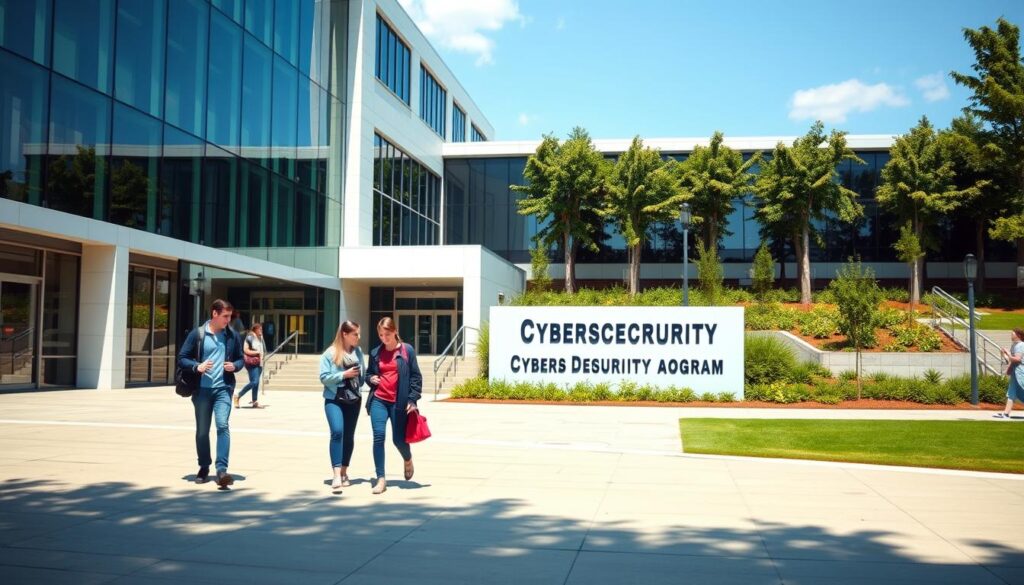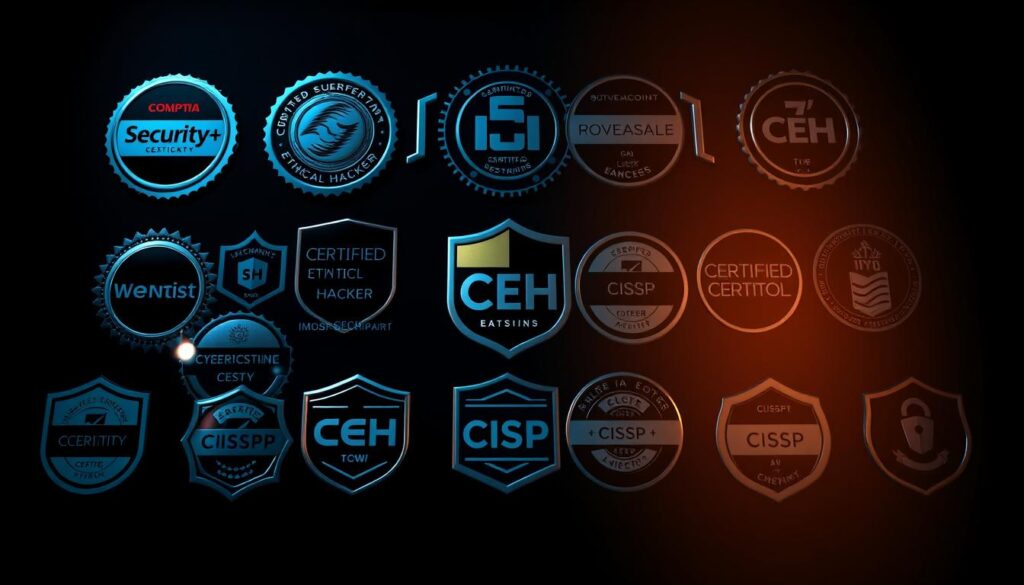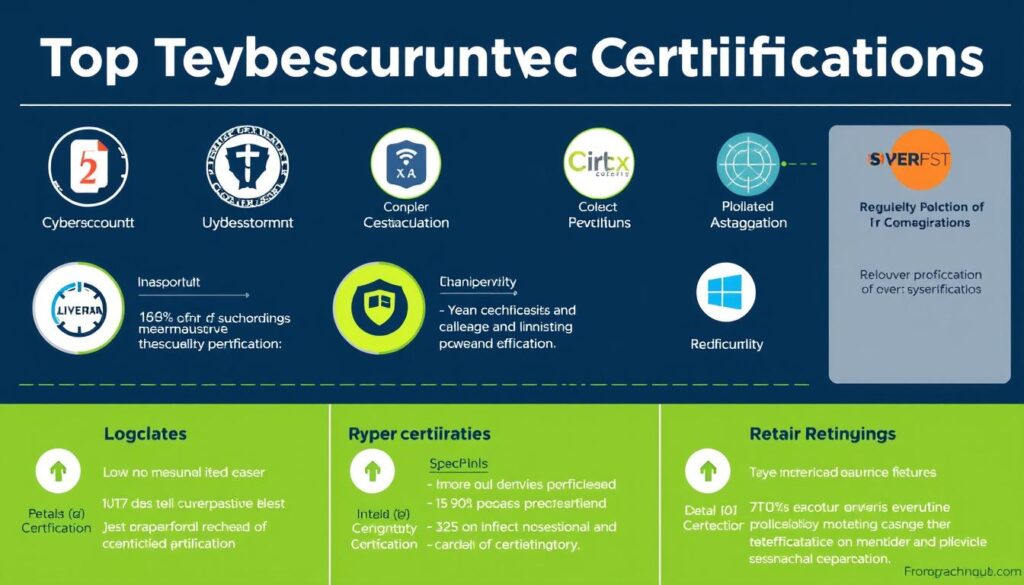The cybersecurity landscape is rapidly evolving, and the demand for skilled professionals is skyrocketing. According to IBM’s Cost of a Data Breach 2023 Report, the global average cost of a data breach was $4.45 million, a 15% increase over the last three years. This alarming trend underscores the need for robust cybersecurity measures and skilled professionals to protect sensitive information.
As the US Bureau of Labor Statistics predicts a 31% growth in cybersecurity jobs through 2029, it’s clear that this field offers a promising career path. But what educational background is required to succeed in this industry? In this article, we’ll explore the various degree options and alternative paths that can lead to a successful cybersecurity career.
Key Takeaways
- Various educational pathways can lead to a successful career in cybersecurity.
- Traditional degree options range from associate to doctoral levels.
- Alternative paths like bootcamps and industry certifications can complement formal degrees.
- Employers look for essential skills and knowledge areas beyond academic credentials.
- Informed decisions about education can be made based on career goals and industry requirements.
Understanding the Cybersecurity Landscape
Cybersecurity has become a critical concern for organizations, driving demand for skilled professionals. As the digital landscape evolves, the need for robust security measures has never been more pressing. The increasing frequency and sophistication of cyber threats have made cybersecurity a top priority for both public and private sectors.
The Growing Importance of Cybersecurity
The importance of cybersecurity is growing due to the rising number of cyber threats and the expanding digital footprint of organizations. As technology advances, new vulnerabilities emerge, making it crucial for companies to invest in cybersecurity measures to protect their assets.
- Increasing threat landscape
- Expanding digital footprint
- Rising demand for skilled professionals
Current Industry Demand and Job Outlook
The employment of cybersecurity professionals is projected to grow 32% during the decade, much higher than the average growth rate. Almost 600,000 cybersecurity jobs across the U.S. wait to be filled, with public agencies and private companies looking for penetration testers, cybersecurity analysts, and senior security leaders.
The demand for cybersecurity professionals is high across various sectors, with a wide range of roles available, from entry-level positions to senior leadership roles. Professionals with expertise in areas like cloud security, ethical hacking, and data protection are particularly in demand.
What Degree Do You Need for a Career in Cyber Security?

The path to a successful cybersecurity career involves choosing the right degree program. As you explore your options, you’ll find that various degree levels can lead to a career in this field.
Associate Degrees in Cybersecurity
An associate degree in cybersecurity can provide a foundational understanding of security concepts, networking, and risk management. These programs typically take two years to complete and can prepare you for entry-level positions in the field.
Bachelor’s Degrees in Cybersecurity
A bachelor’s degree in cybersecurity offers a more comprehensive education, covering topics such as threat analysis, cryptography, and security protocols. This degree can open doors to more advanced roles and is often preferred by employers.
A bachelor’s program in cybersecurity typically takes four years to complete and provides a broad understanding of computer systems, networks, and security measures.
Master’s Degrees in Cybersecurity
Pursuing a master’s degree in cybersecurity can elevate your career, providing advanced knowledge and specialized skills. These programs may require just 30 credits and can be completed in as little as 12 months. A cybersecurity master’s degree conveys important information and skills in intelligent systems, computer engineering, and computer architecture.
With a master’s degree, you can explore various specializations, such as cryptography, network security, or cybersecurity leadership. Some programs offer research-oriented degrees culminating in thesis projects, while others focus on practical applications.
By advancing your education, you can prepare for senior roles such as security engineer, cryptographer, or penetration tester. According to Payscale, master’s degree holders in cybersecurity can earn an average base salary of $89,000 per year.
Advanced Degree Options for Cybersecurity Specialists

Advanced degree options are available for cybersecurity specialists looking to deepen their understanding and expertise. As the field of cybersecurity continues to evolve, professionals are seeking advanced education to stay current with emerging technologies and methodologies.
Cybersecurity professionals can pursue doctoral programs or specialized graduate certificates to enhance their knowledge and skills. These advanced degree options provide focused education in specific cybersecurity domains, allowing professionals to gain expertise without the time commitment of a full degree program.
Doctoral Programs in Cybersecurity
Doctoral programs in cybersecurity offer advanced research opportunities and specialized knowledge in areas such as security management, digital forensics, and information assurance. These programs are designed for professionals seeking to become leaders in the field or to contribute to the development of new cybersecurity technologies and methodologies.
Specialized Graduate Certificates
Specialized graduate certificates in cybersecurity are designed to provide focused education in specific areas, typically requiring 12-18 credits and less than a year to complete. These certificates can complement existing degrees, allowing professionals to gain cybersecurity expertise without starting a new degree from scratch. Some programs even allow certificate credits to be applied toward future degree programs, such as MBAs with a concentration in cybersecurity.
- Gain focused education in specific cybersecurity domains like digital forensics and network security.
- Complement existing degrees with cybersecurity expertise.
- Apply certificate credits toward future degree programs.
- Stay current with emerging technologies and methodologies.
Alternative Paths to a Cybersecurity Career
You don’t need a traditional degree to start a career in cybersecurity; alternative paths can be just as effective. Many professionals have successfully entered the field through non-traditional means, and you can too.
Cybersecurity Bootcamps

Cybersecurity bootcamps offer intensive training programs that equip you with the necessary skills to enter the cybersecurity workforce. These bootcamps are designed to be immersive and hands-on, providing practical experience.
When searching for the best cybersecurity bootcamps, consider factors such as curriculum, instructor expertise, and job placement rates to ensure you’re getting a high-quality education.
Self-Directed Learning Resources
For those who prefer learning at their own pace, there are numerous self-directed resources available. Online courses, tutorials, and cybersecurity communities can provide valuable knowledge and skills.
Utilizing these resources effectively requires discipline, but they offer the flexibility to learn whenever and wherever you want.
Industry Certifications Worth Pursuing

Industry certifications are a crucial aspect of a cybersecurity professional’s career. They validate your knowledge and skills to potential employers. Certifications such as CompTIA Security+ and Certified Ethical Hacker (CEH) are excellent entry points.
Advanced certifications like Certified Information Systems Security Professional (CISSP) and Certified Information Security Manager (CISM) can propel your career to senior positions. Understanding the difference between vendor-neutral and vendor-specific certifications is also important.
According to recent studies, 72% of employers require IT certifications for specific roles, making them a valuable addition to your cybersecurity credentials.
Essential Skills for Cybersecurity Professionals
Cybersecurity professionals must possess a unique blend of technical knowledge and business acumen to effectively protect organizations from evolving threats. As you advance in your cybersecurity career, you’ll need to develop a comprehensive set of skills that go beyond technical expertise.
Technical Skills and Knowledge
A strong foundation in technical skills is crucial for cybersecurity professionals. This includes knowledge of security frameworks, risk management, and compliance requirements. You’ll need to stay up-to-date with the latest technologies and threats, as well as understand how to implement effective security measures to protect against them.
Some of the key technical skills required in cybersecurity include:
- Proficiency in security tools and technologies
- Understanding of network and system vulnerabilities
- Knowledge of threat analysis and mitigation strategies
- Familiarity with incident response procedures
Soft Skills and Business Acumen
While technical skills are essential, they’re not enough on their own. Cybersecurity professionals also need to possess strong soft skills and business acumen to effectively communicate with stakeholders, manage risk, and align security strategies with business objectives.
Some of the key soft skills and business acumen required in cybersecurity include:
- Communication skills: The ability to explain complex technical concepts to non-technical stakeholders
- Analytical thinking: The capacity to approach security challenges creatively and develop effective solutions
- Business acumen: Understanding how security aligns with business objectives and risk management
- Teamwork and collaboration: The ability to work effectively with IT and business teams to implement security measures
By combining technical expertise with soft skills and business acumen, you’ll be well-equipped to succeed in a cybersecurity career and protect organizations from evolving threats.
Career Paths Based on Education Level
As you progress in your cybersecurity career, the educational background and experience you acquire will significantly influence the roles you’re eligible for. Your education level can open doors to various career opportunities, from entry-level positions to advanced leadership roles.
Entry-Level Positions
With a foundational education in cybersecurity, such as an associate or bachelor’s degree, you can qualify for entry-level positions. These roles typically include cybersecurity analyst, security analyst, or IT security specialist. In these positions, you’ll work under the supervision of experienced professionals to monitor and protect an organization’s computer systems and networks.
Key responsibilities may include:
- Monitoring security logs and identifying potential threats
- Implementing basic security measures
- Assisting in incident response efforts
Mid-Level Cybersecurity Roles
As you gain experience and possibly pursue further education, such as a master’s degree in cybersecurity, you become eligible for mid-level roles. These positions often involve more responsibility and may include titles like senior security analyst, security consultant, or incident response manager.
At this level, you’ll be expected to:
- Develop and implement security strategies
- Lead incident response teams
- Conduct risk assessments and vulnerability testing
Advanced and Leadership Positions
Advanced technical specialists and cybersecurity managers often possess master’s degrees. With significant experience, typically 8+ years, you can aspire to senior-level and leadership positions. These roles include Chief Information Security Officer (CISO), Security Director, and Chief Security Architect, involving strategic decision-making and organizational leadership.
Responsibilities at this level include:
- Developing comprehensive security strategies
- Managing large teams and overseeing budgets
- Communicating with executive leadership
These top positions require a comprehensive skill set that combines deep technical knowledge with business acumen, leadership abilities, and strategic thinking. They also come with significant compensation packages, including high base salaries, bonuses, and other executive benefits.
Factors to Consider When Choosing Your Educational Path
When choosing your educational path in cybersecurity, several factors come into play. The rapidly evolving nature of the cybersecurity landscape means that your educational choices must be informed by current industry trends and future projections.
Career Goals and Aspirations
Understanding your career goals is crucial in selecting the right educational path. For instance, if you’re aiming for a leadership role, you may need to pursue advanced degrees or certifications that demonstrate your expertise. On the other hand, if you’re looking to enter the field quickly, a bootcamp or entry-level certification might be more suitable. Aligning your education with your career aspirations ensures that you’re investing your time and resources effectively.
Time and Financial Investment
The time and financial investment required for cybersecurity education can vary significantly. Degree programs, for example, can take several years to complete and require substantial financial investment. In contrast, certification courses or bootcamps can be completed in a shorter timeframe and may be more cost-effective. You need to weigh the costs against the potential benefits and consider your personal circumstances before making a decision.
Industry Requirements and Trends
Staying abreast of industry requirements and trends is vital in making informed educational choices. The cybersecurity landscape is constantly evolving, with new threats and technologies emerging regularly. To remain relevant, you need to be aware of the latest developments and adjust your educational path accordingly. This might involve pursuing emerging specializations like cloud security, IoT security, or AI/ML security.
By considering these factors and staying informed about industry trends, you can make educated decisions about your educational path and set yourself up for success in the cybersecurity field.
Conclusion
With the growing demand for cybersecurity professionals, choosing the right education is crucial. Various paths can lead to a successful career in this field.
You now understand the different educational options, from traditional degrees to alternative credentials. The key is selecting a path that fits your goals and circumstances.
Continuous learning is vital in the ever-evolving cybersecurity field. While formal education is important, employers also value practical experience and demonstrated skills.
As you begin your educational journey, stay flexible and open to opportunities. Your choices should balance immediate employability with long-term career goals.
Take the next step in your education, and you’ll be on your way to a fulfilling career in this rewarding field.
